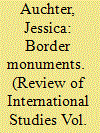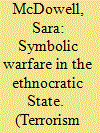|
|
|
Sort Order |
|
|
|
Items / Page
|
|
|
|
|
|
|
| Srl | Item |
| 1 |
ID:
120466


|
|
|
|
|
| Publication |
2013.
|
| Summary/Abstract |
Immigrant deaths have increased in recent years due to changes in border enforcement practices, yet less attention has been paid to the memorialisation of undocumented immigrants who die crossing the US-Mexico border. This article explores the ordering mechanisms of statecraft through an examination of how the dead bodies of undocumented migrants pose a resistance to these mechanisms. I first lay out my conception of statecraft and the bordering practices involved in this specific context, then address the memorialisation of undocumented immigrants who lost their lives crossing the border. The article embarks on a journey through anonymous desert gravesites and small desert cemeteries haunted by the spectres of immigration. It explores the contestation surrounding memorialisation of death through the monument, the narratives of anonymity surrounding the memorialisation of undocumented immigrants, and the counter-memory discourses that emerge in an effort to rewrite the meaning of these migrant deaths. These counter-memorial discourses, I argue, posit desert border monuments as a threat to statecraft because they cannot be situated within the (b)ordering mechanisms of the state.
|
|
|
|
|
|
|
|
|
|
|
|
|
|
|
|
| 2 |
ID:
168877


|
|
|
|
|
| Summary/Abstract |
After a genocide, leaders compete to fill the postwar power vacuum and establish their preferred story of the past. Memorialisation, including through building memorials, provides a cornerstone of political power. The dominant public narrative determines the plotline; it labels victims and perpetrators, interprets history, assigns meaning to suffering, and sets the post-atrocity political agenda. Therefore, ownership of the past, in terms of the public account, is deeply contested. Although many factors affect the emergence of a dominant atrocity narrative, this article highlights the role of international interactions with genocide memorials, particularly how Western visitors, funders, and consultants influence the government's narrative. Western consumption of memorials often reinforces aspects of dark tourism that dehumanise victims and discourage adequate context for the uninformed visitor. Funding and consultation provided by Western states and organisations – while offering distinct benefits – tends to encourage a homogenised atrocity narrative, which reflects the values of the global human rights regime and existing standards of memorial design rather than privileging the local particularities of the atrocity experience. As shown in the cases of Rwanda, Cambodia, and Bosnia, Western involvement in public memory projects often strengthens the power of government narratives, which control the present by controlling the past.
|
|
|
|
|
|
|
|
|
|
|
|
|
|
|
|
| 3 |
ID:
110760


|
|
|
|
|
| Publication |
2012.
|
| Summary/Abstract |
Ethnocracies defend and protect the hegemony and territory of a dominant ethnic-nation. This article considers how paramilitary or guerrilla organisations professing to act on behalf of minority groups have used non-violent spatial practices such as memorialisation to contest the authority of the ethnocratic state and reassert their own (with varying success). Within ethnocracies where territory is fiercely contested memorialisation has the specific capacity to extend the parameters of conflict constituting a form of symbolic warfare. In exploring the nexus between memorialisation and territoriality this article reflects on the symbolic conflict between the LTTE and the Government of Sri Lanka before the former's obliteration in May 2009.
|
|
|
|
|
|
|
|
|
|
|
|
|
|
|
|
|
|
|
|
|